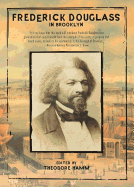
Edited by Brooklyn journalism professor Theodore Hamm, Frederick Douglass in Brooklyn is a fresh and incisive compilation that elucidates the 19th-century political dynamics underlying Douglass's history-making career.
Eight chapters include speeches Douglass delivered in Brooklyn, as well as coverage of those speeches in various New York newspapers. Hamm's thoughtful introductions to each contextualize Douglass's soaring oratory and reveal the vibrant nucleus of Brooklyn civic life in the Civil War era, a nucleus not as progressive as some might think. That Douglass's speeches routinely sparked controversy shows how the abolitionist movement was divided into different camps, including de-facto segregationists and those advocating mass migration and colonization of Africa. Hamm also discusses the virulent anti-black racism that existed, ironically, among the city's marginalized Irish population. Iconic figures like Walt Whitman, Horace Greeley, John Brown and Abraham Lincoln play important roles not only in Douglass's speeches, but also in Hamm's enlightening introductions.
The star of the collection is undoubtedly the slave-turned-writer whose essays and speeches will always be important to American political discourse. In his impassioned arguments for full racial equality--and his sharp criticisms of white supremacy and political gradualism--Douglass presciently touched upon social issues of division and assimilation still relevant in the 21st century. He is by turns scathing and poetic, and his best proverbs convey timeless moral values: "Many a man can march out on to the perilous edge of battle, but has not the moral courage to confront popular prejudice." Frederick Douglass in Brooklyn is a much-needed restatement of an indispensable American voice. --Scott Neuffer, freelance journalist and fiction author

